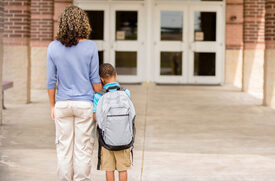 By Kerri-Ann O'Halloran The topic of January's professional development training was school refusal. Currently, school refusal is a topic on the minds of parents, school personnel, and related service providers alike. Attendance at school is at the forefront of educational concerns at the national and local level. The presenters relied on research from Kearney (et. al.), as well as case studies from PBS clinicians, to provide a comprehensive presentation. In the training, the presenters reviewed various types of school refusal and their topography including truancy, school withdrawal, school exclusion, missed classes, tardiness, attending after engaging in problem behavior, and/or attending with intense dread or somatic complaints. These represent a continuum of behavior associated with school refusal, and there may be different functions for each. The presenters noted that it was important to recognize that school refusal may be the symptom of an underlying medical and/or psychiatric concern. It is imperative that these issues be addressed when considering a treatment plan for school refusal. Medical/psychiatric issues often associated with school refusal include separation anxiety, social anxiety, generalized anxiety, depression, fear/phobias, panic disorders, substance abuse, and gastrointestinal issues.
According to Kearney (2008), the functions of school refusal align with those typically described by behavior analysts and include avoidance of school-related stimuli, escape from aversive or evaluative situations at school, gaining attention from significant others, gaining access to tangibles or activities outside of school, and/or medical issues. Clinicians involved in school refusal cases should identify risk-factors which may be present, as well as provide assessment prior to treatment. Assessment of school refusal takes various forms including the use of school attendance data generally readily available. Clinicians are encouraged to complete a records review of any pertinent documents in the student’s file, as well as interviews of the student, school personnel, and family. Formal assessments, such as the School Refusal Assessment Scale-Revised and The School Avoidance Scale should also be completed, along with behavioral observations. Together, these assessments will allow the clinician to determine the function of the behavior as well as begin to prepare a treatment plan. The presenters emphasized that school refusal treatment must be multi-dimensional, and multi-pronged. Generally, the treatment package may include medical/pharmacological intervention, cognitive-behavioral strategies, social skills training, family/parent training, and behavior consultation. The treatment should be based on the function, which was determined through the functional assessment. The presenters also provided strategies specific to those diagnosed with autism, which should be considered when planning treatment. Measurement of progress can take multiple forms, and success should not be restricted to school attendance. Goals can be physical return to school part of the day, increased participation in school activities, or simply getting out of bed in the morning. Measures of success should include quality of life measures (for students and their families), and small successes should be reinforced. The presenters reviewed four school refusal case studies during the presentation, each with different assessments, functions,and treatment packages. In each case, progress was noted, albeit on varying levels.
0 Comments
Leave a Reply. |
AuthorWith 30+ years in the field of Behavior Analysis and 6 Ted Carr Alums, we have lots to discuss and share! Archives
April 2023
Categories |
|
APA and BACB Approved Providers
|
Join us on social media
Please report broken links to [email protected]
|
 RSS Feed
RSS Feed


